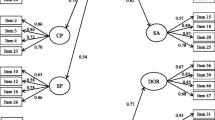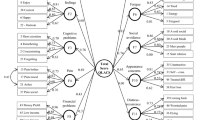Abstract
Objective
The study aims to examine the psychometric properties of the Holistic Well-Being Scale (HWS), a new instrument developed on the Eastern concepts of affliction, and equanimity in a new sample involving patients with cancer.
Methods
A cross-sectional survey was conducted with 300 patients with cancer in Singapore. The patients completed the HWS, WHO-5 Well-Being Index (WHO-5), and Hospital Anxiety and Depressions Scale (HADS). Thirty-two patients participated in the 2-week retest.
Results
Mixed findings were obtained from the original seven-factor model in our sample: six factors had acceptable internal reliabilities (Cronbach’s α; range, 0.657–0.809), and construct validities were partially supported. Factor analysis suggested three factors: Blissful-self (α = 0.874), Disturbed-self (α = 0.885) and Embittered-others (α = 0.709). The novel factors demonstrated good test-retest reliability (ICC; range, 0.894–0.930) and construct validities, which were shown by significant correlations with HADS and WHO-5 in the predicted directions.
Conclusions
The present study is the first step taken to validate a scale that is essential in the development of culturally appropriate psychosocial interventions to support and promote personal well-being of cancer patients. The findings suggest that the three-factor model may be more applicable to the Singapore context, but it does not necessarily invalidate the original HWS. The results were discussed in terms of the meaning of the original HWS factors and cultural differences in coping behaviors between Singapore and Hong Kong, though both are Asian countries. The HWS could be further tested in other Asian populations as achieving holistic well-being is a common goal for patients in many cultures.
Similar content being viewed by others
References
Barwais F (2011) Definitions of wellbeing, quality of life and wellness. Retrieved from http://nwia.idwellness.org/2011/02/28/definitions-of-wellbeing-quality-of-life-and-wellness/, dated December 8 2014
Seligman MEP (2011) Flourish—A new understanding of happiness and well-being—and how to achieve them. Nicholas Brealey Publishing, London
Dodge R, Daly AP, Huyton J, Sanders LD (2012) The challenge of defining wellbeing. Int J Wellbeing 2:222–235
Diener E (2013) The remarkable changes in the science of subjective well-being. Perspect Psychol Sci 8:663–666
Diener E (2009) Subjective well-being. In: Diener E (ed) The science of well-being. Spring, New York, pp 11–58
Diener E, Oishi S, Lucas RE (2003) Personality, culture, and subjective well-being: emotional and cognitive evaluation of life. Annu Rev Psychol 54:403–425
Diener E, Suh EM, Lucas RE, Smith HL (1999) Subjective well-being: three decades of progress. Psychol Bull 152:276–302
Ryff CD (2013) Psychological well-being revisited: advances in the science and practice of eudaimonia. Psychother Psychosom 83:10–28
Ryff CD (1989) Happiness is everything, or is it? Explorations on the meaning of psychological well-being. J Pers Soc Psychol 57:1069–1081
Ryff CD, Keyes CIM (1995) The structure of psychological well-being revisited. J Pers Soc Psychol 69:719–727
Ryff CD, Singer B (2008) Know thyself and become what you are: an eudiamonic approach to psychological well-being. J Happiness Stud 9:13–39
Whitford HS, Olver IN (2012) The multidimensionality of spiritual wellbeing: peace, meaning, and faith and their association with quality of life and coping in oncology. Psycho-Oncology 21:602–610
Salsman JM, Yost KJ, West DW, Cella D (2011) Spiritual well-being and health-related quality of life in colorectal cancer: a multi-site examination of the role of personal meaning. Support Care Cancer 19:757–764
McClain CS, Rosenfeld B, Breitbart W (2003) Effect of spiritual well-being on end-of-life despair in terminally-ill cancer patients. Lancet 361:1603–1607
Lazenby JM (2010) On “spirituality”, “religion”, and “religions”: a concept analysis. Palliat Support Care 8:469–476
Chan CHY, Chan THY, Leung PPY, Brenner MJ, Wong VPY, Leung EKT, Wang X, Lee MY, Chan JSM, Chan CLW (2014) Rethinking well-being in terms of affliction and equanimity: development of Holistic Well-being Scale. J Ethnic Cultural Diversity Soc Work 23:289–308
Lazarus RS, Folkman S (1984) Stress, appraisal and coping. Springer, New York
Mishra RC (2013) Moksha and the Hindu worldview. Psychol Dev Soc 25:21–42
Mok E, Martinson I, Wong TKS (2004) Individual empowerment among Chinese cancer patients in Hong Kong. West J Nurs Res 26:59–75
Pollard EL, Lee PD (2003) Child well-being: a systematic review of the literature. Soc Indic Res 61:59–78
Shah H, Marks N (2004) A well-being manifesto for a flourishing society. The New Economics Foundation, London
World Health Organisation (no date) Process of translation and adaptation of instruments. Retrieved from http://www.who.int/substance_abuse/research_tools/ translation/en/, dated December 28 2014
Ketay S, Aron A, Hedden T (2009) Culture and attention: evidence from brain and behavior. Prog Brain Res 178:79–92
Singapore Government Department of Statistics. (2011). Census of Population (2010) Statistical Release 1, Demographic Characteristics, Education, Language and Religion. Department of Statistics, Singapore
McDowell I (2010) Measures of self-perceived well-being. J Psychosom Res 69:69–79
Momtaz YA, Hamid TA, Ibrahim R, Yahaya N, Abdullah SS (2012) Moderating effect of Islamic religiosity on the relationship between chronic medical conditions and psychological well-being among elderly Malays. Psychogeriatrics 12:43–53
Zigmond AS, Snaith RP (1983) The hospital anxiety and depression scale. Acta Psychiatr Scand 67:361–370
Leung CM, Wing YK, Kwong PK, Shum K (1999) Validation of the Chinese-Cantonese version of the Hospital Anxiety and Depression Scale and comparison with the Hamilton Rating Scale of Depression. Acta Psychiatr Scand 100:456–461
Leung CM, Ho SMY, Kan S, Hung CH, Chen CN (1993) Evaluation of the Chinese version of the hospital anxiety and depression scale. A cross-cultural perspective. Int J Psychosom 40:29–34
Koo WH, Chua KL, Ang PT (1999) Validation of Hospital Anxiety and Depression Scale (HADS) among cancer patients in Singapore. SGH Proc 8:230–233
Streiner DL, Norman GR (2003) Health measurement scales: a practical guide to their development and use, 3rd edn. Oxford Medical Publications, New York
Portney LG, Watkins MP (2000) Foundation of Clinical Research: Application to Practice, 2nd edn. Prentice Hall, Upper Saddle River
Kaiser HF (1974) An index of factorial simplicity. Psychometrica 39:38–39
Folkman S (1997) Positive psychological states and coping with severe stress. Soc Sci Med 45:1207–1221
Puchalski CM, O’Donnell (2005) Religious and spiritual beliefs in end of life care: how major religions view death and dying. Tech Reg Anesth Pain Manag 9:114–121
Ow R, Hilyah NS (2014) Malay Muslim Worldviews: Some thoughts for social work practice in Singapore. J Relig Spiritual Soc Work Soc Thought 33:73–94. doi:10.1080/15426432.2014.874261
Ho DY (1995) Selfhood and identity in Confucianism, Taoism, Buddhism, and Hinduism: contrasts with the West. J Theory Soc Behav 25:115–139
Tsai DF (2001) How should doctors approach patients? A Confucian reflection on personhood. J Med Ethics 27:44–50
Sochu V (2011) The four foundation of mindful awareness. Middle Way 85:131–138
Whitman SM (2007) Pain and suffering as viewed by the Hindu religion. J Pain 8:607–613
Chen YH (2006) Coping with suffering: the Buddhist perspective. In: Wong PTP, Wong JCJ (eds) Handbook of multicultural perspectives on stress and coping. Springer, US, pp 73–89
Palsane MN, Lam DJ (1996) Stress and coping from traditional Indian and Chinese perspectives. Psychol Dev Soc 8:29–53
Kline RB (2005) Principles and practice of Structural Equation Modeling, 2nd edn. Guilford Press, New York
Peterman AH, Fitchett G, Brady MJ, Hernandez L, Cella D (2002) Measuring spiritual well-being in people with cancer: The Functional Assessment of Chronic Illness Therapy-Spiritual Well-Being Scale (FACIT-Sp). Ann Beh Med 24:49–58
Department of Statistics (2011) Census of Population 2010, Statistical Release 1. Singapore Government Department of Statistics, Singapore
Acknowledgments
We would like to thank all the patients and medical social workers from NCCS who participated in this study. We thank Professor Cecilia Chan for her professional inputs to the paper preparation. There was no funding support for the study.
Conflict of interest
The authors declare that they have no conflict of interest.
Author information
Authors and Affiliations
Corresponding author
Rights and permissions
About this article
Cite this article
Lee, G.L., Fan, G.K.T. & Chan, S.W.C. Validation of Chinese and English versions of the Holistic Well-being Scale in patients with cancer. Support Care Cancer 23, 3563–3571 (2015). https://doi.org/10.1007/s00520-015-2736-3
Received:
Accepted:
Published:
Issue Date:
DOI: https://doi.org/10.1007/s00520-015-2736-3




